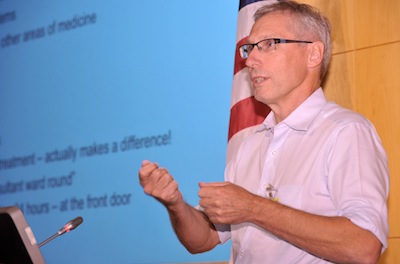 Emergency medicine is the ultimate team sport where specialists, physicians and paramedics work together under extreme pressures in any number of life threatening events, students at Weill Cornell Medical College in Qatar (WCMC-Q) were told.
Emergency medicine is the ultimate team sport where specialists, physicians and paramedics work together under extreme pressures in any number of life threatening events, students at Weill Cornell Medical College in Qatar (WCMC-Q) were told.
The analogy was made by Professor Dr. Peter Cameron. Professor Dr. Cameron is the chairman and head of the emergency department at Hamad Medical Corporation (HMC) and president of the International Federation for Emergency Medicine. He leads a new multi-disciplinary team that is tasked with transforming emergency services across all of HMC’s hospitals.
“Hamad is currently undergoing an extensive program of redevelopment and construction that will place it at the forefront of emergency medical services on a similar standard to the best hospitals in the world,” Professor Cameron said.
“A comprehensive review of Hamad’s emergency department practices has led to improvement recommendations based on international best practices that have been implemented rapidly by a globally recognized multi-professional team.”
“We now have an exceptionally strong team of local and international experts to lead the continuing transformation of our emergency medical services. Our recruitment strategy is designed to attract even more new emergency specialists and retain the best of our trainee emergency doctors. Our objective is to transform our emergency department into a world leading emergency center, ensuring improved patient care and satisfaction.”
Hamad General Hospital (HGH) has one of the busiest emergency departments in the world, treating between 1,200 and 1,500 patients on an average day. The emergency department is supplemented by services provided at Al Khor and Al Wakra with the most serious cases handled at HGH.
Qatar was in a unique position, and with a thriving economic base, among very few countries capable of large scale implementation of quality health care facilities, said Professor Cameron.
Professor Cameron said the emergency department at HMC provided both a stimulating and challenging environment where young physicians can develop and be exposed to a wide range of useful and often rare medical experiences. This was largely because of the diverse population and the influx of temporary migrant laborers from mainly underdeveloped countries who present with a range of uncommon diseases.
In a country where nearly half the population is obese and half of the population aged over 40 suffers from diabetes that will invariably lead to further serious health problems including heart disease and renal failure, there will be an increasing need for young physicians to consider a career in emergency medicine in Qatar, Professor Cameron said.
“It is not a career suited to everyone,” he warned but he encouraged students with an interest in emergency medicine to seriously consider the opportunities available at HMC.


